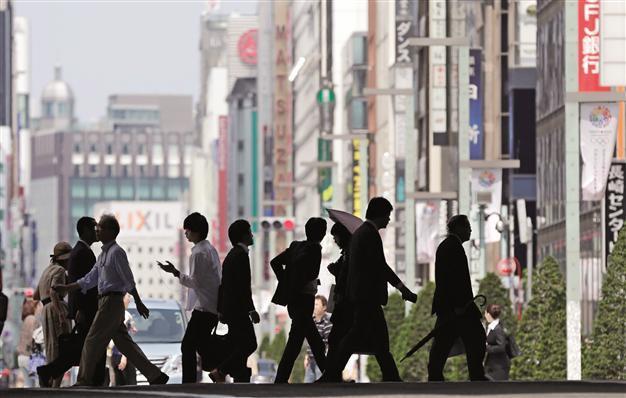Japanese economy grows again, signaling recovery
TOKYO - Agence France-Presse

Pedestrians cross a street in Tokyo’s Ginza shopping district Japan says its economy grew again in the first quarter to March. REUTERS photo
Japan said yesterday that its economy grew again in the quarter to March, pointing to a recovery as Tokyo and its hand-picked central bank team set about stoking the world’s third-largest economy.The 0.9 percent on-quarter growth - or 3.5 percent on an annualised basis if the data were stretched over a year - confirmed Japan’s exit from recession as consumers spent more, although the nation’s cautious firms did not follow suit.
The data was seen by some observers as an early mark of success for Prime Minister Shinzo Abe’s bid to stimulate the long-stagnant economy with a policy prescription of big government spending and aggressive central bank easing.
Dubbed “Abenomics”, the moves mark a renewed assault on the deflation that has plagued Japan’s economy for years, crimping private spending and business investment.
The central bank’s recent policy moves have helped push down the value of the yen, giving a boost to the export sector as it makes Japanese firms more competitive overseas and inflates the value of repatriated foreign income.
The currency’s steep decline in recent months -- losing around one-quarter of its value since November -- has translated into a huge rally on the Tokyo Stock Exchange with foreign investors piling into Japanese stocks.
Japanese economy on track to recovery
“The Japanese economy is on the right track to recovery,” said Hideki Matsumura, senior economist with the Japan Research Institute. “Individual spending is picking up as the value of assets, including stocks, rose on the back of the brighter economic outlook. Exports are also recovering. The economy is expected to grow further for now thanks to the impact of Abenomics.” But a 0.7 percent drop in capital spending highlighted still-weak spending by firms, while a series of tax hikes aimed at doubling the national sales tax to 10 percent by 2015 could also hit private spending, analysts said.
“The January-March figure was quite strong, which confirmed that the Japanese economy hit bottom late last year,” said Shinichiro Kobayashi, economist with Mitsubishi UFJ Research and Consulting.
“But consumer spending may slow again if salaries remain unchanged especially after Japan introduces a hike in consumption tax.” Abe has called on the nation’s employers to hike their employee pay to stimulate spending.
Japan eased out of recession in the last quarter of 2012, after the economy shrunk on weak export demand tied to financial turmoil in the key European market, a strong yen and a diplomatic row with China that sparked a consumer boycott of Japanese goods.
Meanwhile, Japan logged a modest pickup in factory output in March as the unemployment rate hit a multi-year low. But the country’s trade deficit more than quadrupled to $3.6 billion in March compared to the same period a year earlier.
















